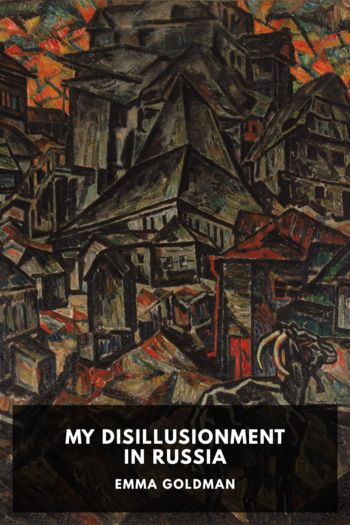The Conquest of Bread Peter Kropotkin (best summer reads of all time .txt) 📖

- Author: Peter Kropotkin
Book online «The Conquest of Bread Peter Kropotkin (best summer reads of all time .txt) 📖». Author Peter Kropotkin
It now remains for society, first, to extend this greater productivity, which is limited to certain industries, and to apply it to the general good. But it is evident that to utilize this high productivity of labour, so as to guarantee well-being to all, Society must itself take possession of all means of production.
Economists, as is their wont, will not fail to remind us of the comparative well-being of a certain category of young robust workmen, skilled in certain special branches of industry which has been obtained under the present system. It is always this minority that is pointed out to us with pride. But even this well-being, which is the exclusive right of a few, is it secure? Tomorrow, maybe, negligence, improvidence, or the greed of their employers, will deprive these privileged men of their work, and they will pay for the period of comfort they have enjoyed with months and years of poverty or destitution. How many important industries—the textiles, iron, sugar, etc.—without mentioning all sorts of short-lived trades, have we not seen decline or come to a standstill on account of speculations, or in consequence of natural displacement of work, or from the effects of competition amongst the capitalists themselves! If the chief textile and mechanical industries had to pass through such a crisis as they have passed through in 1886, we hardly need mention the small trades, all of which have their periods of standstill.
What, too, shall we say to the price which is paid for the relative well-being of certain categories of workmen? Unfortunately, it is paid for by the ruin of agriculture, the shameless exploitation of the peasants, the misery of the masses. In comparison with the feeble minority of workers who enjoy a certain comfort, how many millions of human beings live from hand to mouth, without a secure wage, ready to go wherever they are wanted; how many peasants work fourteen hours a day for a poor pittance! Capital depopulates the country, exploits the colonies and the countries where industries are but little developed, dooms the immense majority of workmen to remain without technical education, to remain mediocre even in their own trade.
This is not merely accidental, it is a necessity of the capitalist system. In order well to remunerate certain classes of workmen, peasants must become the beasts of burden of society; the country must be deserted for the town; small trades must agglomerate in the foul suburbs of large cities, and manufacture a thousand little things for next to nothing, so as to bring the goods of the greater industries within reach of buyers with small salaries. That bad cloth may be sold to ill-paid workers, garments are made by tailors who are satisfied with a starvation wage! Eastern lands in a backward state are exploited by the West, in order that, under the capitalist system, workers in a few privileged industries may obtain certain limited comforts of life.
The evil of the present system is therefore not that the “surplus-value” of production goes to the capitalist, as Rodbertus and Marx said, thus narrowing the Socialist conception and the general view of the capitalist system; the surplus-value itself is but a consequence of deeper causes. The evil lies in the possibility of a surplus-value existing, instead of a simple surplus not consumed by each generation; for, that a surplus-value should exist, means that men, women and children are compelled by hunger to sell their labour for a small part of what this labour produces, and still more so, of what their labour is capable of producing: But this evil will last as long as the instruments of production belong to the few. As long as men are compelled to pay a heavy tribute to property holders for the right of cultivating land or putting machinery into action, and the owners of the land and the machine are free to produce what bids fair to bring them in the largest profits—rather than the greatest amount of useful commodities—well-being can only be temporarily guaranteed to a very few; it is only to be bought by the poverty of a large section of society. It is not sufficient to distribute the profits realized by a trade in equal parts, if at the same time thousands of other workers are exploited. It is a case of producing the greatest amount of goods necessary to the well-being of all, with the least possible waste of human energy.
This generalized aim cannot be the aim of a private owner; and this is why society as a whole, if it takes this view of production as its ideal, will be compelled to expropriate all that enhances well-being while producing wealth. It will have to take possession of land, factories, mines, means of communication, etc., and besides, it will have to study what products will promote general well-being, as well as the ways and means of an adequate production.
IIHow many hours a day will man have to work to produce nourishing food, a comfortable home, and necessary clothing for his family? This question has often





Comments (0)